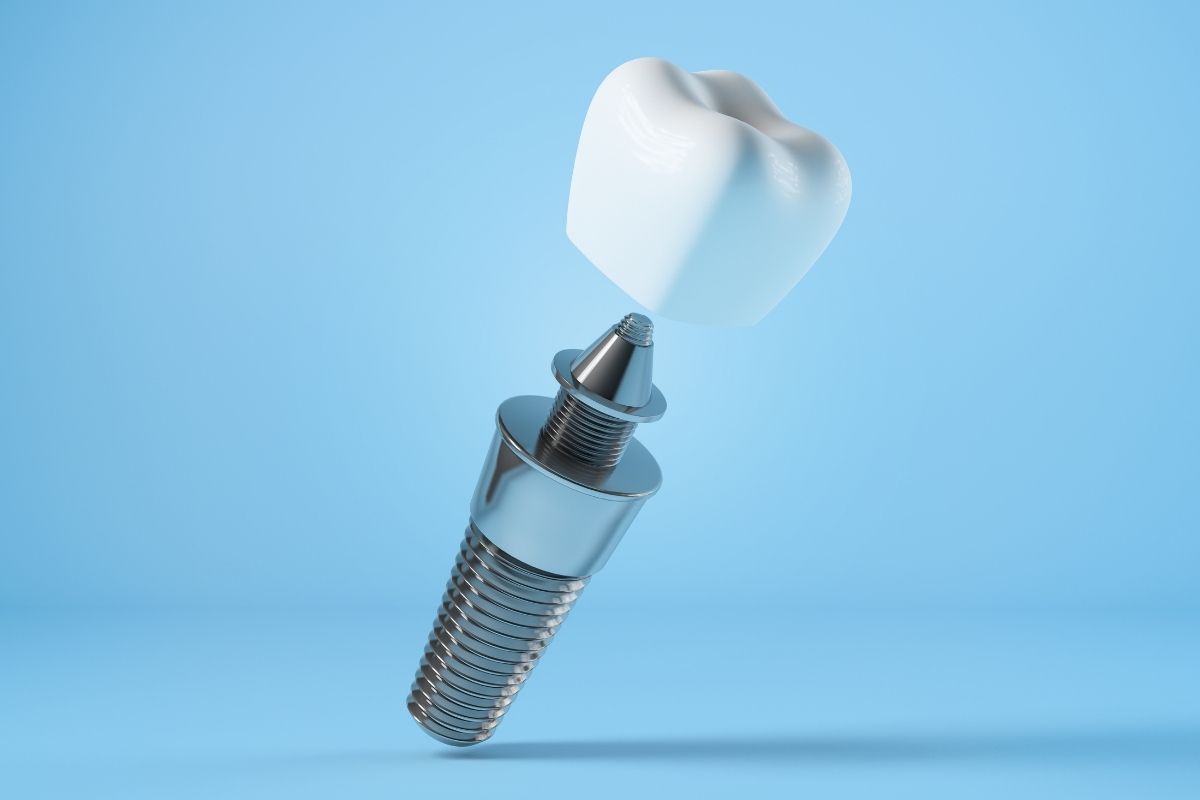Dental implants are one of the most advanced and reliable solutions for replacing missing teeth. Unlike removable dentures or traditional bridges, implants are surgically placed into the jawbone, acting as artificial tooth roots that support crowns, bridges, or dentures. This makes them a long-lasting and natural-looking replacement, restoring both functionality and aesthetics.
Whether you’ve lost a single tooth, multiple teeth, or need a full arch restoration, dental implants can provide a permanent solution that feels and functions like natural teeth. With success rates above 95%, implants are widely considered the gold standard in modern dentistry.
What Are Dental Implants?
A dental implant is a small titanium or zirconia screw inserted into the jawbone to serve as a root replacement. Over time, it fuses with the bone through a process called osseointegration, creating a stable foundation for a crown, bridge, or denture.
The three main components of a dental implant are:
- Implant Fixture – The titanium or zirconia post placed in the jaw.
- Abutment – A connector piece that links the implant to the crown.
- Prosthetic Crown – The visible tooth replacement that looks and functions like a natural tooth.
Why Do You Need Dental Implants?
Dental implants are recommended for a variety of reasons:
- To replace a single missing tooth.
- To restore multiple missing teeth with implant-supported bridges.
- To stabilize removable dentures.
- To restore a full arch using All-on-4 or All-on-6 dental implants.
- To improve chewing, speech, and overall oral health.
Unlike dentures, which can slip or cause discomfort, implants remain securely fixed, offering the closest experience to natural teeth.
Benefits of Dental Implants
- Natural Appearance: Implants look and feel like real teeth.
- Durability: With proper care, implants can last a lifetime.
- Bone Preservation: Prevents jawbone loss that usually occurs after tooth loss.
- Improved Function: Restores full chewing ability and clear speech.
- Confidence Boost: Helps patients smile, eat, and talk without embarrassment.
These advantages make implants one of the most life-changing treatments in dentistry.
Types of Dental Implants
1. Single Tooth Implant
Ideal for patients missing one tooth, restored with a single crown.
2. Multiple Implants
Used when several teeth are missing, supporting bridges or partial dentures.
3. All-on-4 Dental Implants
A popular solution where four implants support a full arch of teeth. Provides stability and avoids the need for individual implants for each tooth.
4. All-on-6 Dental Implants
Similar to All-on-4 but uses six implants per arch for added stability. Recommended for patients with higher bite force.
5. Zygomatic Implants
Special implants anchored into the cheekbone, used when jawbone density is insufficient.
Dental Implant Procedure – Step by Step
- Consultation & Planning – The dentist examines your oral health, takes X-rays or CT scans, and prepares a treatment plan.
- Implant Placement – The titanium post is surgically inserted into the jawbone under local anesthesia.
- Healing & Osseointegration – The bone integrates with the implant over 3–6 months.
- Abutment Placement – The connector piece is attached to the implant.
- Crown Placement – A custom-made crown is fixed on top, completing the restoration.
Modern clinics often use immediate loading implants, where a temporary crown is placed on the same day as surgery.
How Long Do Dental Implants Last?
With proper care, dental implants can last a lifetime. Studies show a survival rate of over 90% after 20 years. Regular dental check-ups, good oral hygiene, and avoiding habits like smoking significantly increase longevity.
Do Dental Implants Hurt?
The procedure is performed under local anesthesia, so patients typically feel no pain during surgery. Mild soreness may occur afterward, similar to a tooth extraction, and is usually manageable with over-the-counter pain relief.
Dental Implants Cost in Turkey
One of the reasons dental implants in Turkey are so popular is affordability. Prices are significantly lower compared to the US, UK, or Europe while maintaining international quality standards.
- Single Dental Implant: $400 – $800 per tooth
- All-on-4 Dental Implants: $3,000 – $6,000 per arch
- All-on-6 Dental Implants: $4,000 – $8,000 per arch
Clinics in Antalya often offer all-inclusive dental tourism packages covering accommodation, airport transfers, and aftercare, making treatment both affordable and convenient.
Dental Implants in Antalya
Antalya has become one of the top destinations for dental tourism due to its world-class clinics, skilled implantologists, and competitive pricing. Patients from all over Europe and beyond travel to Antalya not only for treatment but also for the opportunity to enjoy a Mediterranean holiday. Combining advanced dentistry with tourism makes Antalya a leading choice for patients seeking dental implants in Turkey.
Potential Risks and Considerations
While highly successful, implants carry some risks:
- Infection at the implant site.
- Insufficient bone density requiring bone grafting.
- Implant failure due to poor osseointegration.
- Gum recession around the implant.
Choosing an experienced clinic greatly reduces these risks.
FAQs About Dental Implants
1. How long does the dental implant process take?
Typically 3–6 months, but immediate implants can shorten this time.
2. Can anyone get dental implants?
Most healthy adults are candidates, but patients with uncontrolled diabetes, severe gum disease, or insufficient bone may need additional treatment.
3. What is the success rate of dental implants?
Over 95%, making them one of the most predictable dental treatments.
4. Are dental implants permanent?
Yes, with good care, they can last a lifetime.
5. Why are dental implants cheaper in Turkey?
Lower operational costs allow clinics to offer affordable prices without compromising on materials or expertise.

